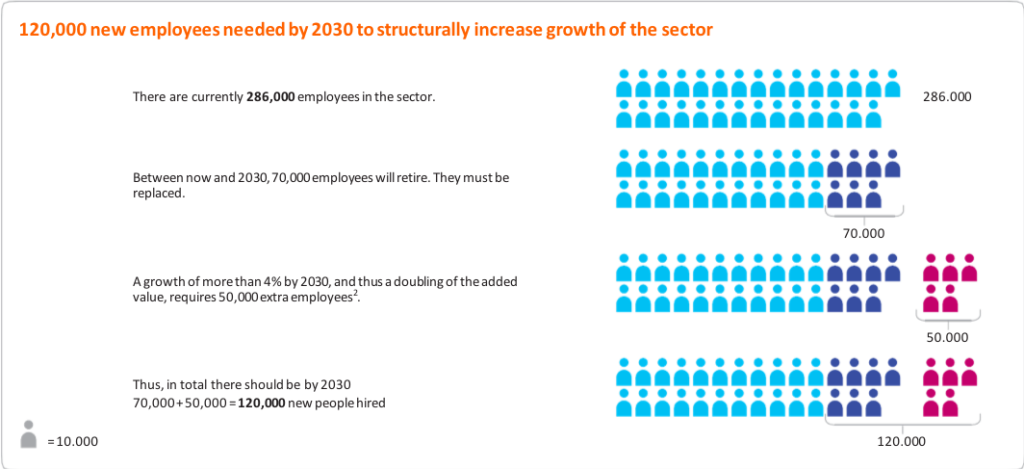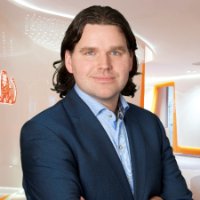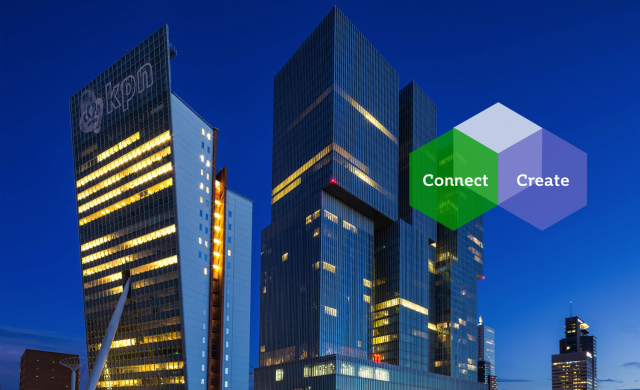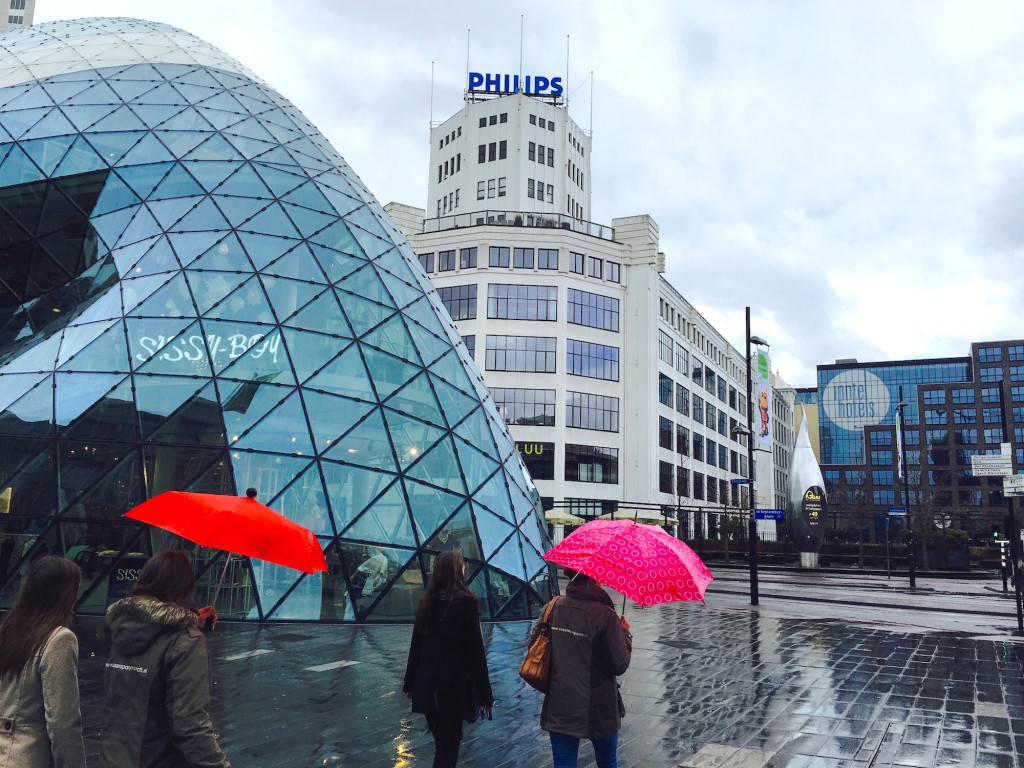(Editor’s note: We started the Eindhoven Business Briefing a few months ago when we had more news in our headquarters city than we could post. This week, we’re including Netherlands-wide news in a special edition because why not ….)
Amsterdam-based financial giant ING has just released a report that shows significant growth in the Netherlands’ tech sector. Which, as it turns out, is both a blessing and a bit of a curse in the 21st century.
It’s one of the most important deep dives into the Netherlands’ huge and growing tech industry … and very good news for our audience, the highly skilled internationals.

WE TRANSLATED THE KEY SLIDE
Unfortunately, it’s not in English. So, we spent a couple of days translating and reading Dutch media reports, where “My Smart Industry: Grow smarter, Grow Faster” from ING Bank still has tech executives and policymakers talking … and wondering how to address its most dramatic finding.
“My Smart Industry Report’s” most publicized finding? The Dutch tech sector will have to recruit 120,000 new people during the next 12 years to stay competitive. There are currently 286,000 jobs in the sector, but “My Smart Industry” projects 70,000 will retire.
As of October 2017, about 20 percent to 25 percent of the companies in the tech sector had a staff shortage that was impeding business growth.
So we called report author, Jurjen Witteveen, senior economist and industry specialist at ING Bank headquarters in Amsterdam to get more details.
Witteveen made two important points/clarifications:

JURJEN WITTEVEEN
• It’s imperative to find new talent, because the Dutch tech sector grew 10 percent for 2017. “While we’ve seen higher growth (historically),” 2017 was the best year for the Dutch sector since the Great Recession, Witteveen said. “It was exceptional.”
• Many media reports about “My Smart Industry” need a bit of clarification, Witteveen said. For example, we interpreted the 120,000 shortage as a “deficit.” It’s not a “deficit” in the literal sense, he said. It’s a tech industry trend line, and the talent is out there, Witteveen said. Dutch technical and research universities in Eindhoven, Delft and Twente are coordinating with companies to deliver that talent, he added. “But it’s a daunting task.”
The Netherlands is known for its tech sector, which includes the most advanced value-added activity.
While tires and computer chips, for example, aren’t made in the Netherlands, “we make the machines that make the tires and the chips,” Witteveen said.
In the U.S., reports such as Witteveen’s from Goldman-Sachs or J.P. Morgan Chase would go to those banks’ top corporate clients, where executives would use the findings to project future earnings or to fine-tune market strategies.
Same in the Netherlands, Witteveen said. His report goes to policymakers in the The Hague, the Netherlands’ political capital, as well as to ING clients. The report has led to strategic discussions framed around, “We have to have a healthy tech sector in the Netherlands.”
If there’s a difference between the US and the Netherlands, a core assumption in all this is that to have a healthy tech sector, the Netherlands must win the global war for talent.
That’s the opposite of what’s going on in the United States.
Writing for CityLab, urban theorist Richard Florida bemoaned what he sees as the Trump Administration’s dismantling of the American innovation engine:
Far from Making America Great Again, Trump and the GOP are putting into place a backward-looking economic and social policy that threatens to undermine the key pillars of American innovation and economic prosperity. They are curtailing immigration and excluding global talent; slashing federal spending for research and development; lashing out at gay and women’s rights; cutting back on spending for state universities; and making efforts to undermine and preempt cities.
Once America’s innovative engine is dismantled, and talented people start to go elsewhere, it will be hard to put it back together again.
By comparison, Witteveen’s report recommends an intensive lobbying campaign abroad to attract staff at prestigious universities and more international schools.
Ultra-high-tech ASML – based in Eindhoven – which makes the machines that make computer chips, alone employs about 100 nationalities, he noted in the interview.
“We need expats.”
Here are some of the findings:
• The revolution in electric transport is coming at the expense of petrol and diesel. The rise of the electric car has a direct impact on about 30 percent of the automotive supply chain. One scenario is that, by 2035, 100 percent of cars sold in Europe will be electric, but too many Dutch companies still rely on revenue from parts that aren’t in electric vehicles.
• Eindhoven is going to be increasingly important in the War for Talent, Witteveen predicted, because of its cluster of high-tech companies and its location at the junction of Germany, the Netherland and Belgium. ASML, Philips and NXP, global ultra-tech leaders, are either based in Eindhoven, or have operations here.
He also noted Eindhoven’s link to China, where all those countries have operations.
The Next Big Thing for KPN is a new startup challenge with HighTechXL
 Okay, back to Eindhoven, where there are two pieces of big news coming out of HighTechXL, the tech accelerator.
Okay, back to Eindhoven, where there are two pieces of big news coming out of HighTechXL, the tech accelerator.
First, Amsterdam-based telecom company KPN and HighTechXL are collaborating, searching for The Next Big Thing for KPN as another big corporation looks for inspiration from small, nimble teams.
KPN and HighTechXL are putting on a hackathon Thursday, 22 March from 11:30 – 17:00 in Eindhoven. KPN is looking for smart, connected and secure hardware with AI, blockchain and data challenges to create The Next Big Thing for KPN.
The Next Big Thing challenge will seek out the best and brightest high-tech minds to shape the future of the cable/mobile giant.
Or maybe something completely new. Anything goes in this ideation hackathon!
Why go? Because first of all, it’s free. So what do you have to lose?
Second, you’ll be in the room at a cross-industry networking event with startups, corporates, high-tech opinion leaders, KPN experts and HighTechXL innovation experts.
Third, KPN was early in the game when it comes to working with, and investing in, startups. We’ll have more on that later.
Winning teams win cool prizes and giveaways. And of course, there will be drinks and snacks.
Startups can register for the challenge with a free ticket along with a few paragraphs about your motivation and why you consider yourself a change-maker.
Email this description to [email protected] no later than 21 February.
KPN officials will review your application and confirm your participation within two weeks of your registration or no later than one week before the event.
If you just want to attend, you can register here on Eventbrite.
(Editor’s note: This event will definitely happen in Eindhoven, but the venue is to be determined. We will update this event when we receive confirmation.)

HighTechXL Spring 2018 cohort adds focus on robotics, AI for medical domain
At the same time as the KPN challenge is coming together, HighTechXL is launching its seventh high-tech accelerator program. This iteration will have a special focus on startups with robotics and AI for medical applications. This fits in nicely with Eindhoven’s existing foundation of robotic surgery companies including Preceyes.
HighTechXL execs are scouting for startups in technologies/applications in Mechatronics, Big Data, Machine Learning & AI, Robotics and Precision Engineering in health disciplines such as cardiology, oncology, neurology and surgery.
Of course, the accelerator is also looking for startups in its foundational categories of:
· IoT
· 3D printing
· Autonomous and near-autonomous vehicles
· Energy storage
· Clean tech
· Advanced materials
Selected teams get, well, a LOT including:
- A 3-month result-oriented program run by the experienced HighTechXL Team with focus on customer traction and funding.
- Hundreds of hours of expert support not just from ASML, Philips and NTS, but also specialists from EY, ABNAMRO Bank in expertise areas such as sales, engineering, manufacturing, IP, supply chain, finance, legal, internationalization and investment.
- Possible pilots with our partnering companies and beyond
- Support from hundreds of mentors formally connected to HighTechXL
- Easy access to potential customers, partners and suppliers
- Professional workspace at the High Tech Campus Eindhoven, the prime tech campus in Europe, where 160 companies and institutes are based.
- A 15,000 euro cash contribution
Startups in robotics and AI medical domain sector can sign up here.
Startups in the other tech sectors can sign up here.

Will Eindhoven finally get some love from Den Haag?
Speaking of Eindhoven, we hear every day about how this innovation center is – oddly – the ugly stepchild of Dutch cities when it comes to funding from the government.
Since we first arrived here in 2015, we’ve heard over and over again that Eindhoven and the Brabant region get pennies on the euro compared to the Randstad cities of Amsterdam, Rotterdam, Den Haag and Utrecht … even though Eindhoven is the high-tech engine of the Dutch economy.
Take, for instance, ASML, a homegrown tech company that owns an 80 percent share of the photonics market. ASML posted net income of 2 billion euros for 2017 – up 44 percent – on top-line income of 9 billion euros.
Or NXP, recently acquired by Qualcomm. NXP has 45,000 employees around the globe. What does Amsterdam have? Some banks and booking.com.
Finally, Eindhoven is stepping up and asking for 170 million euros so it can compete with other high-tech centers such as The Valley, Munich and Shanghai.
Eindhoven leaders want to improve the city’s infrastructure (needed!), build a center for the high-tech manufacturing industry, set up a design district and introduce English-language cultural events geared to foreign staff. All of which make sense to us.
https://youtu.be/ohGjSkckDfM
• Retail fashion aggregator Otrium just got a 750,000 euro investment from a group of investors that includes a former Tommy Hilfiger executive.
• NXP and Chongqing in China just signed an agreement to establish the NXP China Applications Development Center for Auto Electronics. The center will help China’s domestic carmakers build electronic control units using NXP chips.
Chongqing, a megacity with more than 30 million inhabitants located in the eastern part of China, plays a major role in China’s modern automobile industry. It’s the country’s largest automobile production base with 14 vehicle manufacturers.














